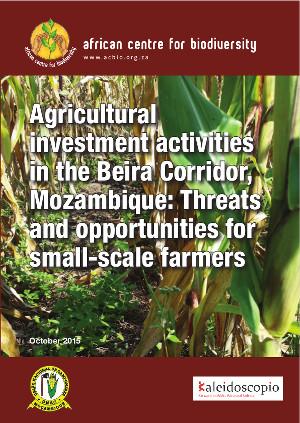Latest Resources

20 June 2016
Green Revolution dead-end in Malawi: Two case studies— AGRA’s Pigeon Pea Project and Malawi’s Agr...
This report that the Alliance for a Green Revolution’s ( AGRA’s) sponsored pigeon pea project in Malawi was a dismal failure and its agrodealer project had some major and fundamental weaknesses. The AGRA pigeon pea project and the Malawi Agro-dealer Strengthening Programme (MASP) were implemented under AGRA’s Soil Health Programme (SHP) and the Programme for […]

18 April 2016
Zimbabwean smallholder support at the crossroads: Diminishing returns from Green Revolution seed ...
This scoping report is published jointly by the African Centre for Biodiversity (ACB and the Zimbabwe Small-Scale Organic Farmers’ Forum (ZIMSOFF). The report focuses on government and donor farm input subsidy programmes (FISPs) and seed aid in facilitating the spread of Green Revolution technologies and raises questions about who really benefits from these programmes. It […]

3 April 2016
Africa to lose heritage crops to multinationals ‘donating’ GM technology
The African Centre for Biodiversity (ACB), in a new report titled, “For your own good!” The chicanery behind GM non-commercial ‘orphan crops’ and rice for Africa shows that the GM industry is expanding its grasp to African traditional crops such as cassava, sorghum, sweet potato, pigeon pea, cowpea, banana as well as rice under the […]

4 December 2015
The expansion of the commercial seed sector in sub-Saharan Africa: Major players, key issues and ...
Sub-Saharan Africa’s seed systems are undergoing a profound transition, with the private sector leading the way. This report outlines some of the major trends and activities of the major players involved in this, from Monsanto and DuPont Pioneer to the Alliance for a Green Revolution in Africa (AGRA) and the broader donor community.

9 November 2015
Which way forward for Zambia’s smallholder farmers: Green Revolution input subsidies or agroecology?
In this report, we provide a critique of the Green Revolution Farmer Input Subsidy project in Zambia, looking at its impacts particularly for small holder farmers and their seed systems.

23 October 2015
Agricultural investment activities in the Beira Corridor, Mozambique: Threats and opportunities f...
Agricultural growth corridors are key tools for the expansion of the Green Revolution onto the African continent. In Southern Africa, the Beira Corridor – joining Zimbabwe, Zambia and Malawi to the coast of Mozambique – is one such corridor. The ACB has partnered with UNAC (the National Peasants’ Union) and Kaleidoscopio to produce a report […]

17 October 2015
Fact Sheets on fertiliser, seed, seed laws and FISPs
Fact Sheets produced by the ACB for smallholder farmers in Africa in several languages on a range of topics dealing with seed and plant variety protection laws, including on: the value of farmer managed seed systems; UPOV 1991 and farmers’ rights; the Arusha PVP Protocol; women as custodians of seed, what is a seed law, […]

30 August 2015
AFAP in Ghana, Mozambique and Tanzania—for profits or people?
The chemical fertiliser push in Africa and its implications for smallholder farmers is not receiving enough attention in current discourses concerning Green Revolution policies and practises in Africa. Yet chemical fertilisers are big business on the continent, where its adoption is strongly supported by African governments through subsidy schemes and regional organisations such as NEPAD, […]

12 May 2015
Grabbing Africa’s seeds: USAID, EU and Gates Foundation back agribusiness seed takeover
The latest salvo in the battle over Africa’s seed systems has been fired, writes Stephen Greenberg, with the Gates Foundation and USAID playing puppet-masters to Africa’s governments – now meeting in Addis Ababa – as they drive forward corporation-friendly seed regulations that exclude and marginalize the small farmers whose seeds and labour feed the continent. […]

17 March 2015
Nuanced rhetoric and the path to poverty: AGRA, small-scale farmers, and seed and soil fertility ...
The report indicates a well-coordinated effort by selected states especially the US and in the EU, philanthropic institutions like AGRA, multilateral institutions like the World Bank, donors and multinational corporations (MNCs) including Yara, Monsanto and Pioneer to construct a Green Revolution that aims to produce a layer of commercial surplus producers. This is an explicit […]
